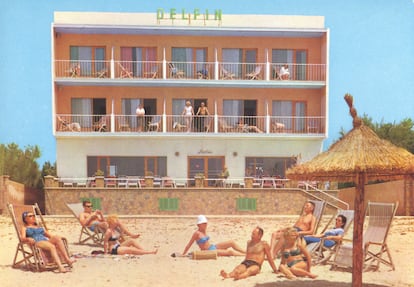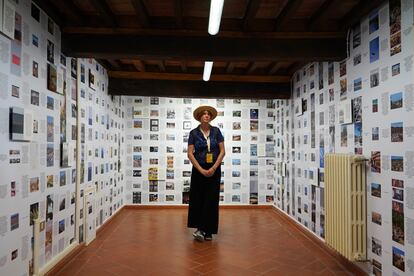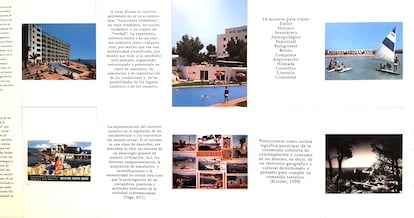The other side of paradise: The abuses of tourism
Photographer Marina Planas is presenting an exhibition in Italy in which she analyzes the impact of the industry in places that have become holiday destinations for millions


That the life and enjoyment of some is built upon the loss of others is something that researcher and visual artist Marina Planas seems to be very clear about. Over the last few years, she has been giving shape to a project that delves into the use and abuse of those places that have become a tourist destination for millions of people, with a particular focus on her own land, the Spanish island of Mallorca. Titled War Approaches to Tourism: All Inclusive, her project was selected by the Institute of Balearic Studies to be exhibited as part of the photography festival Cortona On The Move, which will celebrate its 13th edition in the Italian town of Cortona until October 1.
A mosaic made up of hundreds of small-format photographs, accompanied by quotes by different authors that imbue the images with new readings, covers one of the rooms of Cortona’s Baldelli Palace from top to bottom. It’s an installation that completely invades the space to overwhelm the viewer, in keeping with the story it contains. “We inhabit a territory that has been turned into an industrial, exportable product, conceptualized as Paradise in every commercial discourse that surrounds it,” reads a text by literary critic Nadal Suau next to the image of a man with a donkey selling ceramics to two tourists in bikinis in Santa Ponsa, Mallorca.

It is a reproduction of one of the postcards made by the artist’s grandfather, Josep Planas i Montayà, who in 1949 started a photography company in Mallorca, which he ran for more than three decades. “He introduced the concept of industrial photography to the island and had a monopoly on postcards,” says his granddaughter. “He worked hand in hand with the department of tourism to promote the island as a tourist destination at a time when the Franco regime opened the doors to Europe and the only thing it had to offer was the sun and the beach. Mallorca was the guinea pig for what would later be reproduced in more distant places, like Asia or Latin America. All the iconography that was made to attract tourists to the area was made by my family. It’s not something to be proud of,” she adds with a hint of sarcasm. “In addition to the production of Casa Planas, my grandfather was a collector. In total, the archive holds nearly 3 million images dedicated to tourism. We haven’t found another similar one anywhere in the world.”
Heir to her grandfather’s drive to collect, archive and accumulate, Planas was commissioned by the Museu d’Art Contemporani Es Baluard Foundation to develop a project that would delve into the crisis generated by tourism. Then, to the images from the family archive, she added others that she found online. “It’s been a long time since I stopped taking photographs and making videos with an artistic intention,” the author explains. “It didn’t make sense to add more images to a world that generates so many every day. I use those that already exist in order to recontextualize them and reflect on their exploitation.” Her exhibition in Cortona also includes appropriated photographs that provide a perspective from the present and help show the evolution of the tourism boom; a transformation that is analyzed from the different angles in which it has caused tensions.
In 1948, the universal right to rest was recognized. “After World War II, southern Europe became the playground of the north, and Mallorca, with its beaches and sunny weather, was one of the preferred destinations,” explains Planas. The term “Balearization” was soon coined to describe the transformation of the island’s coastline as a result of the excessive urbanization and the disproportionate tourism boom in the area. “Today’s cathedrals are the shopping centers, theme parks and tourist facilities of all kinds,” reads a text by Carmelo Vega that alludes to leisure consumption as the new religion of a desacralized society. “The first tourism boom [until 1973] had a great impact on the coastal areas,” says Planas. “In the second, people started buying apartments; a form of colonization that continually expels locals from their area. Prices have increased, making it extremely expensive for the working class to buy a home on the island, while attracting wealthy people from all over the world. A whole business revolving around a real estate bubble.”
“Then the mammoth cruise ships arrived, and at the same time rural tourism was established based on the consumption of natural resources. And just when we thought things couldn’t go any further, Airbnb came along. A phenomenon capable of generating a value of $31 trillion with only a staff of about 2,500 workers,” Planas continues. “Life in the city center has become downright difficult for the locals, as the city loses its identity and becomes globalized. When territorial identity is annihilated, we lose history, memory, life.”

Inequality, in its different variants, is analyzed transversally. “At the heart of the operation of tourism are many women with miserable wages. Women like the cleaners, who will never appear on any postcard. Meanwhile, the waiters serving do appear,” points out Planas. There is also reference to the sex industry in places like Thailand, where the brothels used during the Vietnam War were later turned into businesses for sex tourism.
The expansion of multinationals, in many cases subsidized by the states with the intention of generating tourism in the area, as in the case of low-cost airlines, is also reflected in the project, as well as the urban planning that in many cases is carried out to serve the interests of private companies. “Many roads or beaches have become private,” explains Planas. “This is why I usually allude to accumulation by dispossession.” The environmental consequences are also present. “Tourism is one of the most polluting industries, and the island’s economy is practically 100% focused on it. It is difficult to find a way of life in Mallorca that, in one way or another, is not related to this industry.”
Emphasis is also placed on the use of the postcard as a cliché-laden, fictitious representation of reality that defined the places that had to be visited. Landscapes, often idyllic, that ended up being overcrowded. Something that now happens with Instagram. The project also alluded to the way in which tourists are seen by locals and vice versa, as well as the different ways of treating tourists and immigrants.
“Oblivion and neglect are antidemocratic,” says Planas, as she reflects on what it would mean to abandon this archive. It would be “an aggression against memory, but also against the environment and all the issues that are addressed in it. It also means forgetting our history. So many images have been forgotten that it was necessary to remember. Libraries have been burned, archives have been lost.”
Sign up for our weekly newsletter to get more English-language news coverage from EL PAÍS USA Edition
Tu suscripción se está usando en otro dispositivo
¿Quieres añadir otro usuario a tu suscripción?
Si continúas leyendo en este dispositivo, no se podrá leer en el otro.
FlechaTu suscripción se está usando en otro dispositivo y solo puedes acceder a EL PAÍS desde un dispositivo a la vez.
Si quieres compartir tu cuenta, cambia tu suscripción a la modalidad Premium, así podrás añadir otro usuario. Cada uno accederá con su propia cuenta de email, lo que os permitirá personalizar vuestra experiencia en EL PAÍS.
¿Tienes una suscripción de empresa? Accede aquí para contratar más cuentas.
En el caso de no saber quién está usando tu cuenta, te recomendamos cambiar tu contraseña aquí.
Si decides continuar compartiendo tu cuenta, este mensaje se mostrará en tu dispositivo y en el de la otra persona que está usando tu cuenta de forma indefinida, afectando a tu experiencia de lectura. Puedes consultar aquí los términos y condiciones de la suscripción digital.








































